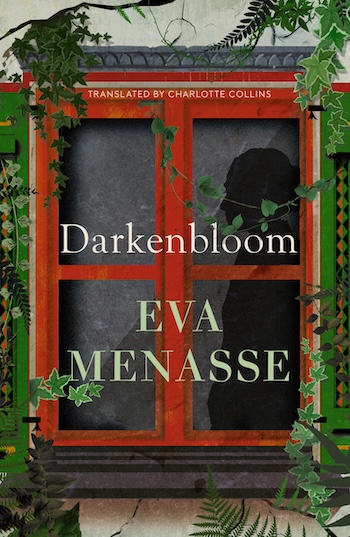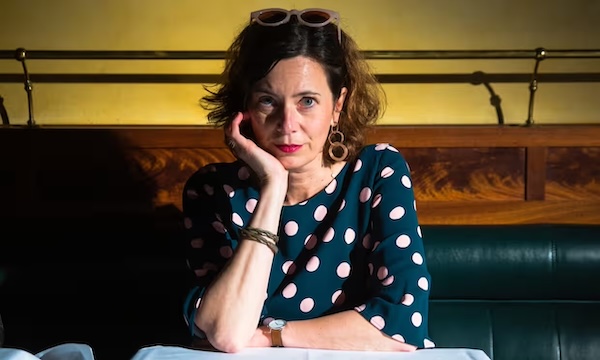Book Review: “Darkenbloom” — The Past is Prologue?
By Kai Maristed
Darkenbloom is a hefty novel, in which a blood-stained, depraved swath of history is laid bare by in-depth examination of a narrow geographical sample (think One Hundred Years of Solitude, or, for that matter, Gone With the Wind).
Darkenbloom by Eva Menasse. Translated by Charlotte Collins. Scribe, 480 pages, $19.
 Eva Menasse, born 1970, is an Austrian journalist and novelist with a keen sniffer for the larger impacts and echoes of everyday acts: those things done and not done, said and left unsaid. Her prolific work has earned her the prestigious Heinrich Böll Prize for Literature (2013) among other major awards. Her titles include The Holocaust on Trial, Angry Rather Than Enlightened, and Pardonable Deadly Sins (my translations). All three hint heavily at themes in her new novel.
Eva Menasse, born 1970, is an Austrian journalist and novelist with a keen sniffer for the larger impacts and echoes of everyday acts: those things done and not done, said and left unsaid. Her prolific work has earned her the prestigious Heinrich Böll Prize for Literature (2013) among other major awards. Her titles include The Holocaust on Trial, Angry Rather Than Enlightened, and Pardonable Deadly Sins (my translations). All three hint heavily at themes in her new novel.
Darkenbloom, settled before the Middle Ages at a trade route crossroads, is a fictional village hard on the real Austro-Hungarian border. Its region, Burgenland, was once justly proud of its excellent wines and gentle landscape. But in 1989, when the novel opens, two people “drove up the local mountain, which didn’t have a name, only the Hazug, an Over-There name… Most Darkenbloomers just said the mountain. At the top [they] gazed down on the countryside of both countries. A beautiful view, all spread out below them, undulating, dappled, vivid and inviting.” It’s a mirage, of course, the one preserved in the rose-colored rear-view glasses of most Darkenbloomers, from the halcyon good old days before Burgenland was divvied up by the stroke of a post-WW I bureaucratic pen between new Austria and new Hungary. With WWII, the Cold War and the Hungarian uprising, local fortunes went from bad to worse. “The border installations, seen from on high… looked as if they had been cobbled out of wire and toothpicks.” However conflict and politicians shifted the goalposts, the Austrian-to-the-bone Darkenbloomers remained stuck on the edge, no longer prosperous, shunned by tourists, in uneasy, sometimes fatal, proximity to Over There.
Darkenbloom is also a hefty, 480 page novel, in which a blood-stained, depraved swath of history is laid bare by in-depth examination of a narrow geographical sample (think One Hundred Years of Solitude, or, for that matter, Gone With the Wind). In this case, a narrow-minded sample as well, because the Darkenbloomers are for the most part just the sort of self-satisfied, self-glorifying, self-pitying, insular, mistrustful-of-all-outsiders, kiss-up-kick-down (remnants of feudal hierarchy) folk that you might expect to find in such a rural backwater, especially if you subscribe to the cliché that clichés can be a useful mental shortcut, i.e., are often true.
Any novel, short or long, generally needs at least one of two, maybe three, attributes to keep us turning the pages. One: some sort of mystery (crudely, a plot). Two, an original, enthralling style — flares of insight, observation, expression, or all three (James Joyce, Marcel Proust, Jon Fosse). A third gambit is a central character so absorbing that the reader cannot let him or her out of their sight. Freud used the term ‘cathecting’ for this sort of emotional imprinting. But to create a Pied Piper is easier said than done, and Darkenbloom, written from the viewpoints of over a half-dozen foregrounded characters, is not that kind of tale.
Eva Menasse’s most striking gift is for quietly revelatory observation. Her assured art won’t be hurried. Nor will she be pinned down by petty chronology. For the sake of immediacy, it’s often the reader’s job to figure out the year, if not the decade, in which a new paragraph/scene opens. Given the relative lack of plot (we’ll get to that), these individual Brueghel-esque encounters, in farm kitchens or pubs or the later (mysteriously) burned-down castle or along the muddy, murderous border, assemble to a patchwork portrait of political change and (spoiler alert!) the immutability of human nature.
Menasse also excels in actual word coinage, neology being one of the funnest (sic) things about writing in German, and a potential headache for translators. The book’s title is a case in point, one that seems to hit the reader over the head with Significance. Charlotte Collins rose handily to the challenge of translating Darkenbloom, although some of the text’s Austro-German zippiness is perforce lost. (And why turn ‘Polizist’ into ‘gendarme,’ an equally foreign word, having a different specific meaning?) In any case, for those who know some German, I enthusiastically also recommend the audio book, if only for the pitch-perfect country vs city dialects. A brilliant reading.
Darkenbloom stretches from 1918 to the fall of the Berlin Wall in late 1989, and German reunification in the year following. The book’s core, though, inhabits the period of Nazi rule after ‘Annexation’ (1938), with its terrors and silences that echo to the present day. The many narrative openings and doubling-backs are bookended by the summer of 1989, when the border buckled under the sheer pressure of would-be escapees, East Germans on the Hungarian border. Mercifully, there’s an historical calendar up front. Also mercifully, a cast of main characters, because Darkenbloom is sung by a chaotic chorale of three generations or more of families ranging from day laborers to His Serene Highness, the conveniently self-exiled Count of Darkenbloom. It’s a testimony to the book’s careful construction that having plunged headfirst into page one of the text, I didn’t miss these handy crutches.
For how could one ever lose track of such figures as Leonore, “Queen of Darkenbloom… a provincial beauty would be an understatement… In her youth she had been told she should enter beauty pageants, but Leonore merely snorted.” Or Resi the innkeeper, who all her life boasts grimly: “I don’t get to leave the hotel, not day nor night.” Or Antal Grun, the grocer, “in his blue overall, with three meagre strands of grey hair combed diagonally across his round head…threading a new roll of paper into his till. Each time he was astonished that it worked… He anxiously imagined the mechanism malfunctioning… the paper curling up…spat out, rejected. The prospect filled him with clammy unease.” If Antal merits extra space here, it’s partly to demonstrate the author’s knack for the telling detail, and also because Antal is the only Jew to have returned home after war’s end. And the others? The Tüffers, original owners of the hotel, or the industrialist Rosmarins? “For seven years, Darkenbloom had been Jew-free.” There was a posted list, it turns out. They went away. What does anyone know?

Eva Menasse — her most striking gift is for quietly revelatory observation. Photo: courtesy of Scribe
We follow individual Darkenbloomers’ evolution, or as it may be, devolution, from childhood to adulthood or old age. A bright boy is dragged down to violence by his tooth and claw inbred clan. Following the brutal Soviet occupation, a cheerful young woman ages to a babbling recluse. A natural-born bully and volunteer henchman vanishes, yet lives on as a bogey brandished by parents over misbehaving children. A Hitlerian Gauleiter, or regional commander, refashions himself as a beloved-by-all patron of the village. Collective memories of the past recede like the drying water supply. And yet, nearly all of these biographies raise questions that no one wants to hear. Until a stranger comes to town.
Mysteries, then. A whole bunch, like piled-up surrendered weapons, or like piled-up — better not even think it, not in Darkenbloom.
But multiple mysteries, writ small, are not the same as a mystery — or a plot. The sum refuses to add up to a whole. Darkenbloom deliberately leaves us with the question, the hole in the center that no amount of patchwork has managed to explain. What happened, that last raucous night at the castle? Why did it later burn down? Who, in ’89, painted white swastikas in the old Jewish cemetery? Why are so many townsfolk dead set against excavating for a reliable water supply? Was Leonore’s daughter’s beloved neighbor lady murdered, in peaceable 1989? Which of these proliferating questions are central to our quest, to the stranger’s quest, and which are not?
“The Austrians are a people who confidently look forward to the past.” Thus Darkenbloom’s epigraph, ‘a proverb.’ A snide remark, or a truth deeper than it sounds at first? It was Shakespeare who wrote, “What’s past is prologue.” Is all history a snake swallowing its tail, a matter of elliptical rotation, the gears of human failings grinding away? If so, Menasse’s morality play of a novel couldn’t arrive at a more appropriate moment. Only this January the far-right Austrian Freedom Party succeeded in solidifying its grip on power, after September’s election win. Then again, circularity — however depressing — could be almost comforting, given what the world faces, or refuses to face, today. Climate devastation, like mass murder, being a one-way street.
But come, reader. Escape to the past. Take a stroll around the golden vineyards and lightning-lit cobbled streets of Darkenbloom. Meet Stitch-Face, and Fritz, the “village idiot,” who carpenters “wooden pyjamas,” aka coffins. And travel agent Rehburg, with “a voice like a worn-out fanbelt.” When the tour is over you, like me, may want to turn back to the opening pages, suspecting that clues to the lesser mysteries, perhaps missed on your first bedazzled round, might after all explain the dark-blooming center. Or else… where does the story end?
Kai Maristed (www.kaimaristed.com) studied politics and economics in Germany; she lives in Paris and Massachusetts. She has reviewed for the Los Angeles Times, New York Times, and other papers. Her four books include the collection Belong to Me, starred by Publishers Weekly, and Broken Ground, a Berlin Wall story. Recent work is in Five Points, Ploughshares, and Agni. Her new collection, The Age of Migration, winner of the Kevin McIlvoy Book Prize, will be published in late 2025.
